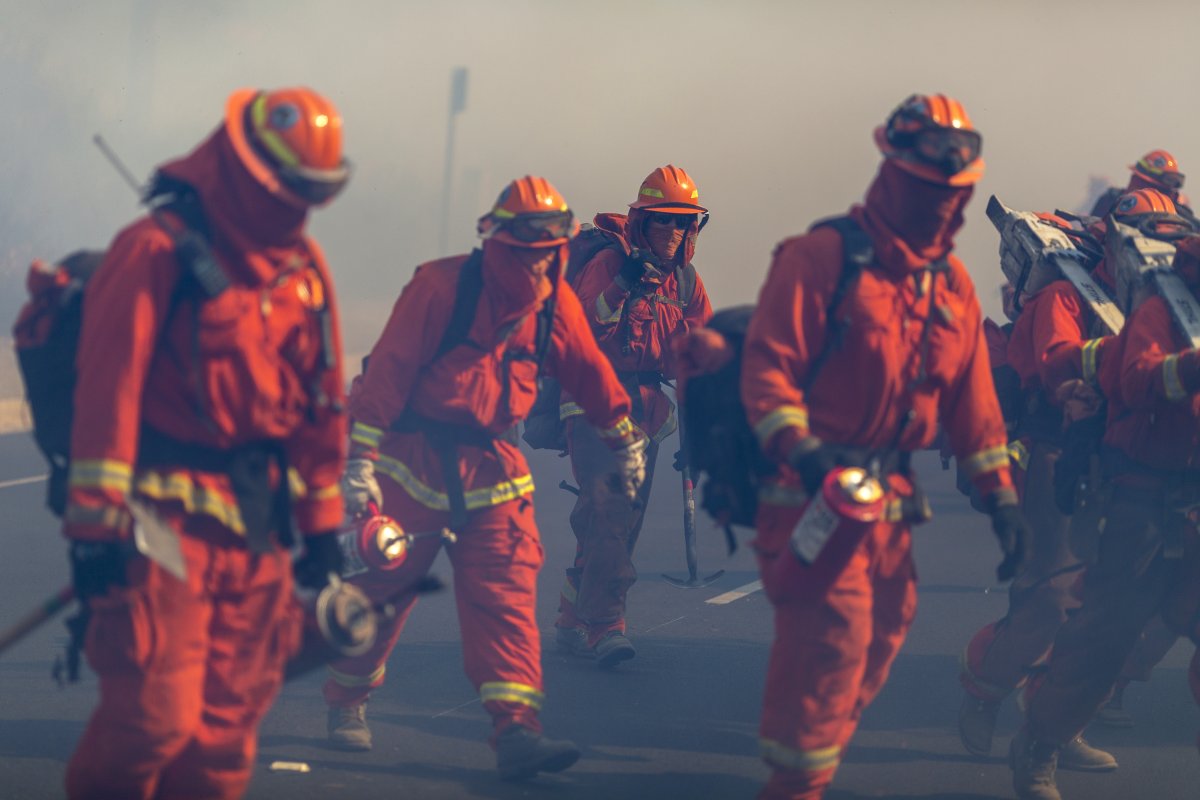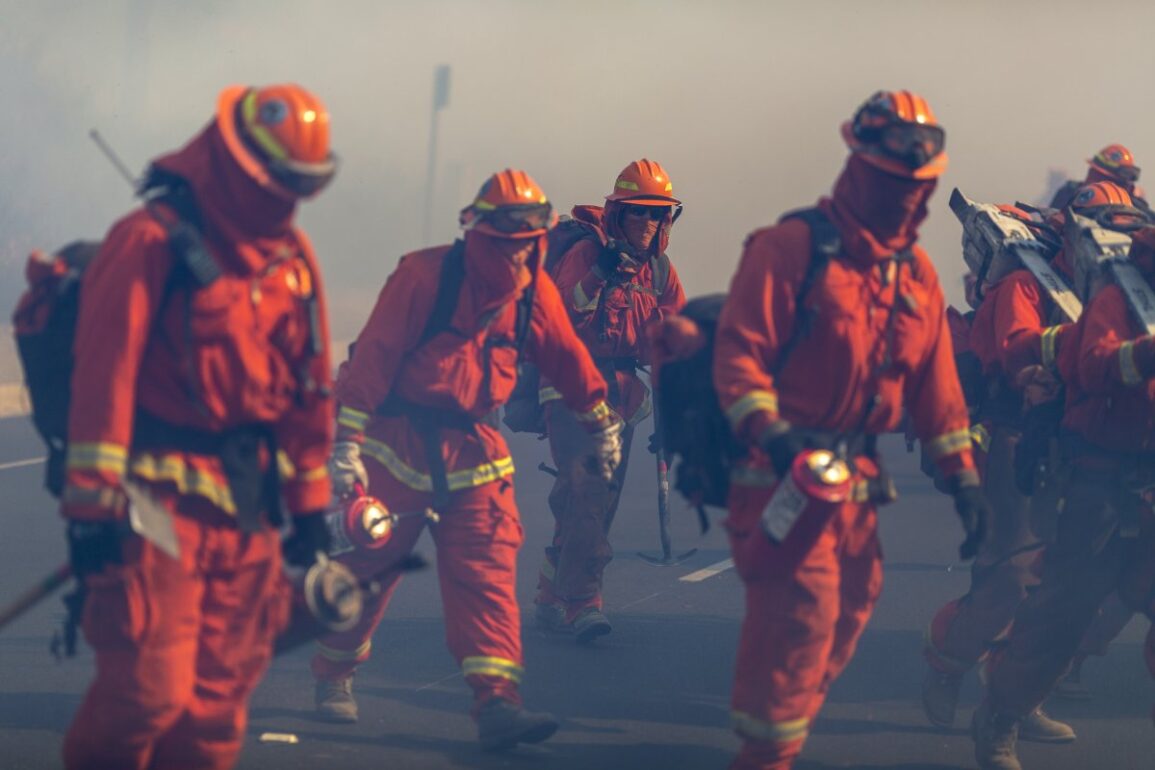As wildfires rage across Los Angeles, nearly 1,000 state prisoners are moonlighting as firefighters on the frontlines, working alongside CAL FIRE personnel to battle the flames. These minimum-security inmates, participants in the California Department of Corrections and Rehabilitation (CDCR) Fire Camp Program, are playing a critical role in slowing the spread of fires in Southern California as they serve their sentences.
“CDCR Fire Camp Program firefighters are proud to be embedded with CAL FIRE personnel to protect lives, property, and natural resources in Southern California,” a CDCR spokesperson told Newsweek.
Why It Matters
California’s fire camps have a long history of responding to the state’s various natural disasters, including wildfires, mudslides and floods. These camps provide crucial support, particularly as California faces increasingly frequent and intense fire seasons. This year alone, incarcerated firefighters have helped combat fires threatening over 30,000 acres in Los Angeles County, where the Palisades Fire remains uncontained.
The work these firefighters perform is essential — and controversial. While participants volunteer for the job and earn between $5.80 and $10.24 per day with an additional $1 per hour during active emergencies, critics argue the compensation is unacceptably low considering the risks involved.
What To Know
California’s current wildfires that have consumed over 30,000 acres across Los Angeles this week. Fueled by the deadly combination of dry conditions, high temperatures and powerful Santa Ana winds, the largest and most destructive is the Palisades Fire, which has burned 17,234 acres and is less than 10 percent contained, according to CalFire. This fire has forced thousands of residents in Los Angeles County to evacuate as flames encroach on homes and infrastructure.
In addition to the Palisades Fire, the Eaton Fire has burned over 13,000 acres near Pasadena, and the Hurst Fire has burned 855 acres. While the Woodley Fire, covering 75 acres, is fully contained, the risk of flare-ups remains due to ongoing red flag warnings. These warnings, issued by the National Weather Service, indicate extreme fire conditions and the likelihood of rapid fire spread.

Inmate firefighters from Oak Glen Conservation Camp near Yucaipa, California fight the Easy Fire on October 30, 2019 near Simi Valley, California. Nearly 800 inmate firefighters have been deployed to the wildfires burning in Los Angeles, including the Palisades Wildfire.
David McNew/Getty Images
Collectively, these fires have destroyed over 2,000 buildings, displaced more than 100,000 residents, and led to at least seven reported fatalities. Efforts to contain the blazes are complicated by strong winds and the rugged terrain, which hinder access and containment. Emergency officials warn that conditions could worsen, prolonging the firefighting efforts.
Along with thousands of firefighters, CDCR told Newsweek that 939 Fire Camp firefighters have been “working around the clock cutting fire lines and removing fuel from behind structures to slow fire spread, including 110 support staff.”
Incarcerated individuals must meet stringent criteria to qualify for the program. Participants must have “minimum custody” status, eight years or less remaining on their sentence, and pass a rigorous medical and mental health screening. Certain convictions, such as arson and sex offenses, automatically disqualify candidates.
The CDCR operates 35 conservation camps across 25 counties, hosting over 1,800 inmates year-round. These camps not only provide emergency response support but also offer training in critical skills like fire suppression and disaster recovery.
Still, transitioning into civilian firefighting roles after release remains a significant challenge for prisoners who accept these roles. Many former inmates, despite their experience on the frontlines, struggle to find jobs in the industry due to licensing barriers and stigma related to their criminal convictions.
What People Are Saying
Princess Griffen, a former inmate firefighter, told CalMatters: “It felt like you were doing something that mattered instead of rotting away in a cell.”
Doug Melville, an expert on Diversity, Equity and Inclusion, in an article for Forbes: “During the most recent U.S. election, California voters rejected Proposition 6, a ballot measure that would have banned forced labor in state prisons. Only a handful of states have abolished forced prison labor: Colorado, Vermont, Nebraska, Utah, Alabama, Oregon and Tennessee.
Will Americans ever change their stance on forced prison labor?
After watching what these men and women battling the most devastating wildfires in Los Angeles history, I know I have.”
Jeff Macomber, secretary of CDCR, in a statement: “Wildfires are a constant and formidable challenge for California. The work of our incarcerated firefighters and staff is an essential part of this effort, and their commitment to protecting lives and property during these emergencies cannot be overstated.”
What’s Next
As the fires rage on, discussions about the role of incarcerated firefighters are likely to continue. Advocates have called for improved pay and post-release job opportunities, while state officials mostly continue to highlight the critical support these camps provide in times of emergency.
There have also been efforts to reform the system, such as Governor Gavin Newsom‘s 2020 law enabling inmate firefighters to expunge their records and apply for firefighting jobs post-incarceration.
This post was originally published on this site be sure to check out more of their content.









